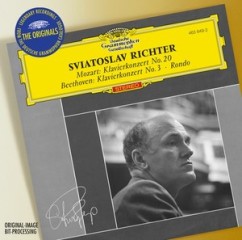Beethoven, Mozart - Piano Concertos (Richter) [2001]
Beethoven, Mozart - Piano Concertos (Richter) [2001]

1. Mozart: Piano Concerto No.20 In D Minor, K.466 - 1. Allegro 14:44 2. Mozart: Piano Concerto No.20 in D minor, K.466 - 2. Romance 10:18 3. Mozart: Piano Concerto No.20 In D Minor, K.466 - 3. Rondo (Allegro assai) 8:12 Sviatoslav Richter - piano Warsaw National Philharmonic Orchestra Stanislaw Wislocki - conductor 4. Beethoven: Piano Concerto No.3 In C Minor, Op.37 - 1. Allegro con brio 17:22 5. Beethoven: Piano Concerto No.3 in C minor, Op.37 - 2. Largo 10:01 6. Beethoven: Piano Concerto No.3 in C minor, Op.37 - 3. Rondo (Allegro) 8:46 7. Beethoven: Rondo In B Flat For Piano & Orchestra, WoO6 9:24 Sviatoslav Richter - piano Wiener Symphoniker Kurt Sanderling – conductor
Let’s get the bad news out of the way immediately. In the Mozart, the orchestral support provided by the Warsaw Philharmonic under Stanislaw Wislocki is never particularly refined. The upper strings are especially nasal-sounding; listen to the nerve-jangling edginess of the violin passagework in the finale, or the shrill tutti lead-in before the first-movement cadenza. Now for the good news. Sviatoslav Richter lives dangerously (he always did), with tremendously forceful playing that’s as implacable as it is highly organized. Interestingly Richter’s speeds aren’t exceptional. It’s just that his sense of rhythm and pacing are so alert and his approach so iron-willed and unyielding that you’re totally gripped by the performance.
Those observations apply even more forcibly to the 1962 reading of the C minor Beethoven concerto with the Vienna Symphony under Kurt Sanderling, which offers superior orchestral playing and better recorded sound. Again, it’s the rigor and ferocity of Richter’s playing that’s crucial. A mood of pronounced seriousness is struck right at the outset in Sanderling’s accompaniment, with emphatic accents and a certain heaviness and grandeur setting the scene for Richter’s first entry. His initial 16th-note salvo is pointedly brutal in effect, and the same snarling acerbity persists. Although critics often complained about the hardness of Richter’s tone in his early recordings, the amazing contrast he finds in the more lyrical textures of the second subject group is another feature that sets this performance apart.
You hear the more sensitive side of Richter’s playing in the calm, contemplative unfolding of the Adagio, too, before the same eruptive virtuosity as before holds you enthralled in the finale. Note how Sanderling follows Richter’s lead in the short orchestral fugato mid-way through the movement–and the masterfully controlled presto at the close is thrilling. These are astonishing performances, only really comparable with others by Richter himself. The Praga label has reissued a live 1956 recording in which Richter was accompanied by the Brno State Philharmonic Orchestra under Bretislav Brakala in the Beethoven Third. The piano playing is very similar, but the orchestral sound and recording quality are poor. DG’s new transfers are brightly lit, with a certain brittleness to the piano sound, but this is an essential reissue. --- classicstoday.com
download (mp3 @320 kbs):
uploaded yandex 4shared mega mediafire solidfiles zalivalka cloudmailru oboom








